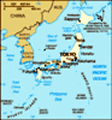Advertisement
Published: July 30th 2021
With so much emphasis on the pandemic and its effect on the Olympics, very little is said about the country itself in the Olympic Games. Japan first participated in the Games in 1912. It was held in Stockholm, and Japan sent only two athletes. One was a sprinter (Yahiko Michima), the other a marathoner (Shizo Kanakuri), but neither won medals. Mishima made the semi finals, but Kanakuri did not finish his marathon. With the popularity and proven skills of Naomi Osaka, it is no surprise that Japan's first Olympic medal was in tennis at the 1920 Games in Antwerp, Belgium. Seiichiro Kashio and Ichiya Kumagae won silver in the doubles, with Kumagae winning another silver in singles. Osaka is the top-rated player in the world, and not coincidentally, the highest paid athlete in the world. Overall, Japan has won 439 medals, including 41 at the recent 2016 Games in Rio. And twelve were gold! Japan has not fared as well in the Winter Games with only 58 medals. Judo, as you might expect, is Japan's most successful sport, with 39 Gold, out of a total of 84 medals. In Rio in 2016, Japan won 12 gold, 8 silver, and 21 bronze,
finishing 7th in the medal race. Japan's first gold medal was in the Triple Jump, Mikio Oda in 1928. This was in the Summer Games in Amsterdam in 1928. Fellow countryman Yoshio Tsuruda won a gold in swimming at the same games. Many Japanese Americans have participated in the Olympics and won medals. Japan has hosted the Olympics three times before, Tokyo Summer Games in 1964, and the Winter Games in Sapporo in 1972, and Nagano in 1998. The men's and women's marathons will take place up north (500 miles) in Sapporo, where it should be much cooler. This is the second time Tokyo has hosted the Paralympics, with the first back in 1964. Tokyo was scheduled to host the 1940 games, but with the threat of war, the Olympics were moved to Helsinki. But the 1960 Tokyo Games were the first to be broadcast internationally, with some events in color. The Japan National Stadium is made of wood, sourced from all 47 of Japan's prefectures. The Games are focused on sustainability, as even the beds in the Olympic Village are made of cardboard, which will be recycled. So, who will carry the Flags for Japan in the Opening Ceremony?
One very familiar name is NBA and former Gonzaga basketball star, Rui Hachimura. The other is Yuri Susaki, and two time wrestling world champion. I would have chosen Naomi Osaka and Hideki Matsuyama (winner of the Masters). BTW, this is the first time in Olympic history that both a man and a woman will carry their country's flag in the Opening Ceremonies. Japan will have 580 athletes marching behind this pair. This year, the 5000 medals won my athletes from around the world are made from precious metals extracted from disused electronic devices. People in Japan were asked to donate disused electronics, like cell phones, for two years. Almost 79 tons were collected. With much attention placed on both American Jesse Owens and the despotic Hitler, people have long forgotten the plight of a Korean runner, Sohn Kee-Chung. He won the marathon in the 1936 Berlin Olympics, but was forced to run for Japan, under the name of Son Kitei. Why? Korea was under the colonial rule of the Japanese Empire. The IOC corrected both is name and country in 2011. Four new sports will be introduced in these Olympic Games, karate, skateboarding, sport climbing and surfing. Baseball and softball will make a comeback from 2008. But how many will we see live with a 13-hour time difference? As far as television, Swimming is the most watched sport, with nearly 1000 competitors from 170 countries. Gymnastics is always popular, from the days of Olga and Nadia, and now Simone. Track and Field has over 2000 competitors, from 200 countries, in 47 events. Basketball and soccer are generally popular events, but if the American teams lose early, interest could wane. Ralph Lauren is providing the opening ceremony unforms, basically blazers shoes, and even a mask. But the unform features a cooling jacket, battery powered devices that create a cooling sensation on the back of the neck. With both competitors and others falling like flies with Covid, I wonder if the Games can continue and for how long? Masks will be worn by all competitors, officials and press. Food is already an issue as well. And the great stories and experiences in the Olympic Village will be very different this year. Testing will be daily. Japan has experienced almost 15,000 deaths due to Covid, and 842,000 coronavirus cases. Yes, these Games will be different. But for athletes who have worked so hard for the last four to five years, it is the opportunity of a lifetime.
Advertisement
Tot: 0.042s; Tpl: 0.011s; cc: 14; qc: 22; dbt: 0.0233s; 1; m:domysql w:travelblog (10.17.0.13); sld: 1;
; mem: 1.1mb







